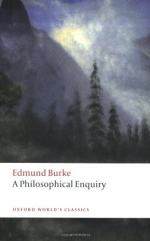
|
| Name: _________________________ | Period: ___________________ |
This test consists of 15 multiple choice questions and 5 short answer questions.
Multiple Choice Questions
1. Why does Burke offer a second edition of "A Philosophical Enquiry Into the Origin of Our Ideas of the Sublime and Beautiful"?
(a) He wishes to change and contradict his own views.
(b) He wishes to expand and further illustrate his theories.
(c) He realizes that he could make more money selling a second edition.
(d) He wishes to directly challenge the criticism of the first edition.
2. According to Burke, what will the result be of the long, close study of an object?
(a) A decreased interest in the object.
(b) A decreased feeling of pleasure.
(c) An increased sense of anxiety.
(d) An increased sensibility of taste.
3. Why are certain drugs enjoyable, according to Burke?
(a) Because people can get them for a low cost.
(b) Because the users only take them for their healthy properties.
(c) Because people become accustomed to their pleasurable effects.
(d) Because the users have no idea of the potential harm of the drug.
4. How does Burke define solitude?
(a) As a positive pain.
(b) As a pleasurable enjoyment.
(c) As a welcome release.
(d) As a necessary evil.
5. How do all emotions and passions affect the human mind?
(a) With unpredictable, greatly varying effects.
(b) By forcing the mind to yield to the heart.
(c) With scarring, searing effects.
(d) By natural, uniform, predictable principles.
6. Why, according to Burke, do we delight in the tragedies of others?
(a) All humans have a sadistic streak.
(b) There is little else in the world in which to delight.
(c) This is a function of sympathy instilled in us by our Creator.
(d) We are happy we are not the victims.
7. Which of the following is one of the general privations Burke lists?
(a) Hunger.
(b) Sleep.
(c) Insanity.
(d) Darkness.
8. What does Burke mean by the word "Taste?"
(a) The sense of taste located on the tongue, which distinguish sweet, salty, bitter, and sour flavors.
(b) Those faculties of the mind which form judgments upon the work of the imagination and the elegant arts.
(c) The notions of personal style that refined, elegant people display when in public.
(d) The sense of distinction that the higher social classes have above the lower social classes.
9. What is the general reason Burke wrote the book, as stated in the First Preface?
(a) Burke was taking dictation on the subject from his longtime mentor.
(b) Burke completely disagreed with all else written on the sublime and the beautiful.
(c) Burke wanted to make money with the publication of this treatise.
(d) Burke was initially at a loss to coherently describe the sublime and beautiful.
10. Why is grief a part of pleasure, according to Burke?
(a) Because grief reminds the individual that life continues.
(b) Because people actively and willfully grieve.
(c) Because all endings are beginnings.
(d) Because grief always gives way to laughter.
11. Into which two classes does Burke group the passions of society?
(a) High- and low-society, based upon the class into which one is born.
(b) General society and the society of the sexes.
(c) The societies of the educated and of the ignorant.
(d) The liberal society and the conservative society.
12. Burke opines that buildings that are great only in dimension are:
(a) The epitome of sublimity in architecture.
(b) Paragons of human imagination.
(c) Too simple and common to be sublime.
(d) Only deceptively large.
13. Which idea is more effective over the other in affecting the imagination, according to Burke?
(a) Originality, rather than imitation.
(b) Obscurity, rather than clarity.
(c) Refinement, rather than coarseness.
(d) Shock value, rather than predictability.
14. What does Burke hope will be the result of his "A Philosophical Enquiry Into the Origin of Our Ideas of the Sublime and Beautiful"?
(a) Readers will learn to control their passions when in specific social settings.
(b) Readers will be well-versed in the scientific method.
(c) Readers will apply principles of taste and passion to the otherwise severe sciences.
(d) Readers will leave the sciences behind in favor of imagination and passion.
15. What does Burke note about youth, as related to taste?
(a) That sensory pleasure is great while judgment is inaccurate.
(b) That innocence does not equal ignorance.
(c) That although judgments may not be sound, taste is excellent.
(d) That youth is the province of true wisdom.
Short Answer Questions
1. What problem does Burke see with the contemporary notion of "taste?"
2. How does Burke define "magnificence?"
3. What example does Burke use to demonstrate that differing tastes stem from the same basic root?
4. What does Burke warn his readers about in the Second Preface?
5. What is the state between pleasure and pain, according to Burke?
|
This section contains 852 words (approx. 3 pages at 300 words per page) |

|




